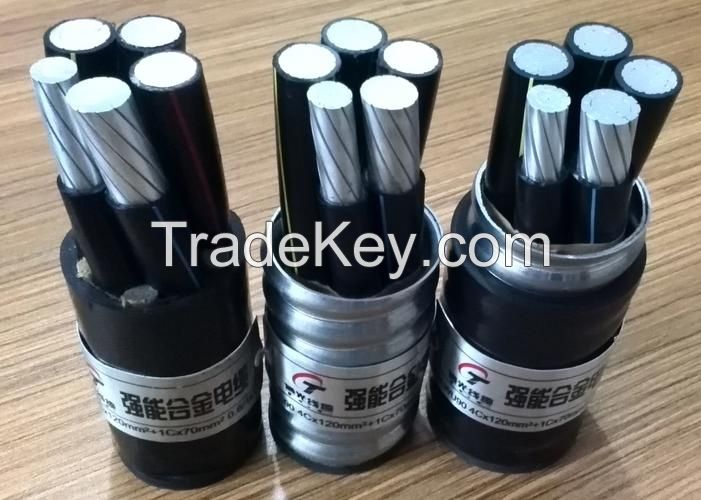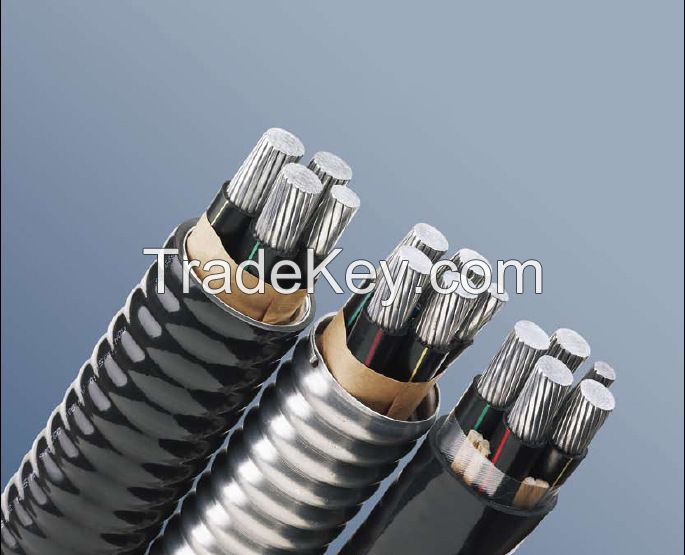The excellent mechanical and electrical properties of aluminum
alloy power cables enable them to be widely used in various fields
of the national economy, such as ordinary residential buildings,
high-rise buildings, elevators, as well as large and small
supermarkets and shopping malls, subways, airports and stations,
hospitals, banks, office buildings, hotels, postal and
telecommunications buildings, proxy buildings, schools, and public
entertainment venues. It can also be used in industries such as
metallurgy, steel, coke, coal mines, power plants, transmission and
transformation power plants, shipbuilding, petroleum, chemical,
pharmaceutical, nuclear power plants, aerospace, military,
papermaking, as well as household appliances, automobiles, public
transportation facilities, and so on.
- ADVANTAGES
(1) The conductivity of aluminum alloy is 61.5% of the commonly
used reference material copper IACS, and the current carrying
capacity is 79% of copper, which is better than the pure aluminum
standard.
(2) Compared to pure aluminum conductors, aluminum alloy conductors
greatly improve their tensile strength and elongation by adding
special components and adopting special processing techniques, and
the elongation rate is increased to 30%, making them safer and more
reliable to use.
(3) Creep resistance: The alloy material and annealing process of
aluminum alloy conductors reduce the tendency of the conductor to
"creep" under heat and pressure. Compared to pure aluminum, the
creep resistance can be increased by 300%, avoiding relaxation
problems caused by cold flow or creep.
(4) Flexibility, due to the excellent bending performance of
aluminum alloy, its unique alloy formula and processing technology
greatly improve flexibility. And aluminum alloy has a 30% higher
flexibility and a 40% lower rebound strength than copper. The
bending radius of general copper cables is 10-20 times the outer
diameter, while the bending radius of aluminum alloy cables is only
7 times the outer diameter, making it easier to connect
terminals.
(5) Strong self weight bearing capacity, aluminum alloy improves
the tensile strength of pure aluminum, aluminum alloy cables can
support 4000 meters of self weight, while copper cables can only
support 2750 meters. This advantage is particularly prominent in
the wiring of large-span buildings (such as sports venues).
(6) Corrosion resistance, inherent in aluminum, is due to the
formation of a thin and sturdy oxide layer when the aluminum
surface comes into contact with air, which is particularly
resistant to various forms of corrosion. The addition of rare earth
elements in the alloy can further improve the corrosion resistance
of aluminum alloys, especially electrochemical corrosion.
Aluminum\'s ability to withstand harsh environments has made it
widely used as a conductor for cables in trays, as well as for many
industrial components and containers. The occurrence of corrosion
is usually related to the connection of different metals in humid
environments, and corresponding protective measures can be used to
prevent corrosion, such as the use of lubricants, antioxidants, and
protective coatings. Alkaline soil and certain types of acidic soil
environments have significant corrosiveness to aluminum, so
aluminum conductors buried directly should use insulation layers or
molded sheaths to prevent corrosion. In sulfur-containing
environments, such as railway tunnels and other similar places,
aluminum alloys have significantly better corrosion resistance than
copper.
(7) The coefficient of thermal expansion is used to calculate the
size change of a material during temperature changes. The thermal
expansion coefficient of aluminum alloy is equivalent to that of
copper. For many years, aluminum connectors have been reliably used
for copper and aluminum conductors, and most electrical connectors
used today are made of aluminum, which is particularly suitable for
aluminum alloys. So the expansion and contraction of aluminum alloy
conductors and connectors are completely consistent.
(8) Considering the compact characteristics solely from the aspect
of volume conductivity, aluminum alloys are inferior to copper.
However, our developed conductors not only have made improvements
in material properties, but also have made significant
breakthroughs in technology. We use unconventional compact
technology to achieve a compact coefficient of 0.93, while the
compact coefficient of irregular lines can reach 0.95, which is the
first in China. By using extreme compression, the shortcomings of
aluminum alloy in terms of volume conductivity can be compensated,
making the stranded conductor core like a solid conductor,
significantly reducing the outer diameter of the core and improving
conductivity. Under the same current carrying capacity, the outer
diameter of the conductor is only 10% larger than that of copper
cable.
(9) Armor characteristics: Most commonly used armored cables in
China use steel tape armor, which has a low safety level. When
subjected to external destructive forces, it has poor resistance
and is prone to breakdown. It is also heavy and has a relatively
high installation cost. In addition, it has poor corrosion
resistance and short service life. And the metal interlocking
armored cable we developed based on American standards uses
aluminum alloy strip interlocking armor. The interlocking structure
between layers ensures that the cable can withstand strong external
destructive forces. Even when the cable is subjected to significant
pressure and impact, the cable is not easily broken down, improving
safety performance.
At the same time, the armor structure isolates the cable from the
outside, even in the event of a fire, the armor layer improves the
flame retardant and fire resistance level of the cable, reducing
the risk of fire. Compared to steel strip armor, the aluminum alloy
strip armor structure is lightweight and easy to install,
eliminating the need for bridge installation and reducing
installation costs by 20% to 40%. Different outer sheath layers can
be selected according to the different usage locations, making the
use of armored cables more extensive.


